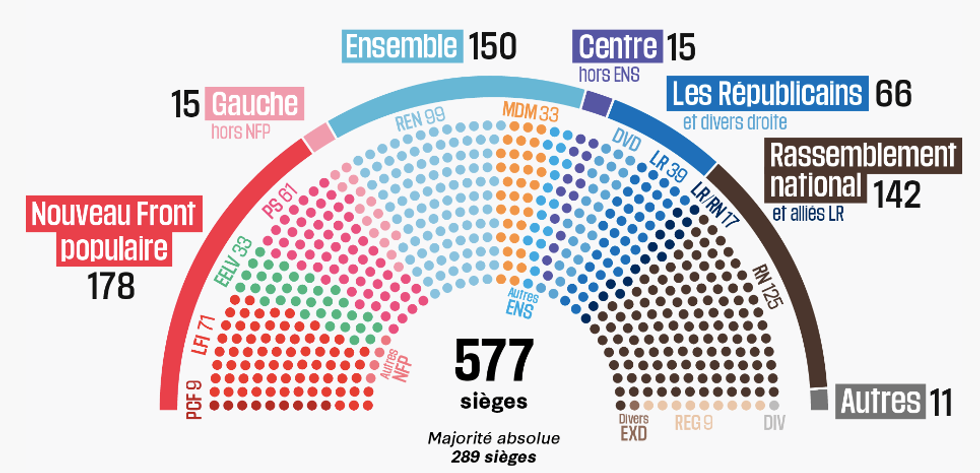Political figures from across the world congratulated France's left-of-center coalition following parliamentary elections on Sunday in which it gained the most seats of any group, outperforming the far-right party that many feared would take control of the National Assembly, in what The Washington Postcalled "one of the greatest political upsets in recent French history."
In the second and final round of voting, the Nouveau Front Populaire (NFP) won roughly 180 out of the 577 seats in the assembly, far from a majority but more than President Emmanuel Macron's centrist coalition, which won about 160, or Marine Le Pen's far-right Rassemblement National (RN), which won about 140 or 145.
Several parties including the leftist La France Insoumise (LFI), the center-left Parti Socialiste (PS), and Les Écologistes, a green party, joined forces to form the NFP after Macron announced a snap election in early June.
The parties came together out of fear of the RN, which led the polls and had the strongest showing of any party or alliance in the first round of the parliamentary elections on June 30. The NFP also opposed Macron's neoliberal agenda and supported progressive economic policies such as a lower retirement age.
Jeremy Corbyn, member of U.K. parliament and standard-bearer of the British left, said the French results provided "an urgent, valuable lesson."
"Don't concede ground to those who sow division and fear," Corbyn, who himself was reelected a few days ago, wrote on social media. "Build a bold left movement that offers an alternative of inclusion and hope. That is how you defeat the far right."
Similarly, U.S. Sen. Bernie Sanders (I-Vt.) argued that the French results offered confirmation of the popularity of progressive economic platforms like the NFP's.
"Here's a simple fact: If politicians stand with working families, working families will stand with you," Sanders wrote on social media. "As it turns out, lowering the retirement age and raising the minimum wage are very popular. Congratulations to the French left for taking on right-wing extremism and winning."
Several members of France's multiracial soccer team, currently competing in the UEFA European Football Championship in Germany, expressed joy and relief at the results of the election back home.
"The victory of the people," midfielder Tchouameni Aurélien wrote on social media.
Forward Marcus Thuram reacted similarly.
"Congratulations to all those who came forward in the face of the danger that hovered over our country," he wrote. "Long live diversity, long live the republic, long live France. The fight continues."
The effort to defeat the far right involved multiple levels of negotiation between left and centrist parties—not just the formation of the NFP, which prevented member parties from running candidates against one another, but also strategic cooperation between the NFP and Ensemble, Macron's own coalition, before Sunday's second round of voting.
Last week, going into the second round, more than 300 of the 577 legislative races had three or more candidates still in contention—in most cases, one NFP candidate, one Ensemble candidate, and one RN candidate. Because of a shared fear of the far right, the NFP and Ensemble negotiated to drop their third-place candidates from more than 220 races so that left and centrist votes wouldn't be split.
The strategy worked, with RN leaders, who last week had been openly speaking about obtaining a parliamentary majority of 289 seats, left with only about half of that figure or less—though even 140 seats marks a significant gain for the party, which had only 88 previously. The tallies are still being finalized, with different media outlets reporting slightly different totals.
 Source: La Libération, based on data from France's interior ministry
Source: La Libération, based on data from France's interior ministry
Luiz Inácio Lula da Silva, the leftist president of Brazil, praised the "maturity" of the groups that joined together to defeat the far right. Polish Prime Minister Donald Tusk, a centrist, expressed relief in light of the impact an RN victory could have had on the Ukraine war.
"In Paris enthusiasm, in Moscow disappointment, in Kyiv relief," Tusk wrote on social media. "Enough to be happy in Warsaw."
The coalition-building stands as a remarkable accomplishment given the challenges that it entailed: Just building the NFP alliance required tricky negotiation. Left-of-center parties, after decades of discord, formed an alliance for the first time in 2022, but it fell apart last year, and, though the PS was part of that alliance, it was not endorsed by prominent center-left figures such as former President François Hollande, who has backed the NFP.
The NFP parties didn't decide in advance whom they'd put forward for prime minister, and the different factions within the alliance are now jockeying for the position. Many of the more centrist NFP figures have declared that it can't be Jean-Luc Mélenchon, the LFI leader, whom they view as divisive.
In any case, Macron has the power to name the prime minister, and it's not clear if he would be willing to name Mélenchon, who ran against him for president in 2017 and 2022. Macron on Monday declined to accept the resignation of Prime Minister Gabriel Attal, an ally from his own party, explaining that he should stay on "to ensure the stability of the country."
That's likely just a temporary solution: Ensemble had a near-majority in the previous parliament but, having lost more than 80 seats, will no longer be strong enough to avoid a vote of no confidence in the prime minister and his government. Macron will have to name a prime minister that a majority of the incoming National Assembly approve of or risk triggering such votes of no confidence. The newly elected parliamentarians are scheduled to begin their first session on July 18.

 Source: La Libération, based on data from France's interior ministry
Source: La Libération, based on data from France's interior ministry